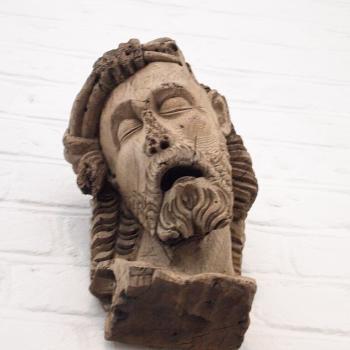
Uploaded by “The Solitary Copt.” From Wikimedia Commons. The copyright holder of this work allows anyone to use it for any purpose including unrestricted redistribution, commercial use, and modification.
In his festal letters written to announce the dates for the fast before Easter and Easter itself, St. Cyril of Alexandria wrote exhortations to his congregations to follow the spirit of the fast so that they could obtain the virtuous disposition the fast was meant to help them achieve. This meant, among other things, a reminder for the acts of charity expected of them:
And in joining to our fasting the honor that comes from good deeds, let us take pity on widows, let us have a care for orphans, let us break our bread for the hungry, let us clothe the naked, let us have a care for those in prison, let us bring into our homes the poor who have no shelter; in a word, let us practice every kind of virtue.[1]
This exhortation was a common theme which St. Cyril consistently repeated in his annual letters. Sometimes it was with very similar words, such as when we read:
As for those who are to be judged, then, let us keep the faith, let us behave lawfully, let us live rightly, discrediting the ways of vice, and practicing every kind of virtue: mutual love and love of the poor. Let us take care for orphans, let us visit widows, let us take pit on the tears of the infirm, let us visit those in prison, let us practice chastity of body. [2]
At other times, St Cyril gave some explanation with his exhortation:
But since it behooves those fond of the renown from on high, and those who have chosen to live in a way pleasing to God above all, to be seen to act in accordance with piety, we will of necessity add to the glory of continence other modes of virtuousness: mutual love, mutual affections, and the readiness to act compassionately toward those in the grip of unbearable poverty. For Christ said somewhere, “Be merciful, because your heavenly Father is merciful.” And the law given through Moses commands, “You will surely open your bowels to your brother who is in need among you.” For the love of the poor is something special. But if one considers it of little account, if any, and says that it is worthless, one will be wholly commending cruelty and inhumanity, and claiming that there is no need for compassion to those in extreme misery. Now is that not a bestial idea, hateful to God, and repellent to the nature that loves mercy? [3]
The foundation was from the call of the Christian to the path of love:
Let us, in short, love our neighbor, and, dismissing all wrongdoing from our own soul, let us bring the homeless poor into our home. This is so that, when we have treated what God has given for our maintenance as belonging in common to the poor, and we have clothed the naked, and in a word, we have girt ourselves with complete obsequiousness to God, we may gain the enjoyment of the good things awaited.[4]
Such an exhortation was not unique to St. Cyril. It can be seen as the common Christian heritage based upon Scripture. It is, therefore, not an attempt to demonstrate some unique idea found in his writings that we mention them, but rather it is to show that he was concerned with more than Christological debates. He was a pastor and he took that role seriously, and that is a part of what made him a saint. In his role as bishop he did more than engage dogmatic controversy, he took on the needs and concerns of his flock. He promoted orthopraxis with his orthodoxy. He proclaimed the need for mutual love and affection among the Christians, a love which was to be found not only in words, but in deeds.
Yes, St. Cyril sometimes, like many of the saints, often acted contrary to his words, showing that at times, his own love for others was imperfect. To be a saint is not to be impeccable, but to be open to the prompting of God, to be perfected by grace. He had authoritarian tendencies which led to various temptations that he often failed to overcome, but yet thanks to grace, and his rightful desire, he was still able to cooperate with God’s will and promote the universal obligation of charity. And this is why he saw the need to remind his flock, and probably himself, that the Christian faith was more than an intellectual exercise, but a way of life. Every Paschal season was a time of renewal, and so, it was a time to return to the labors of charity. Ascetical discipline, which helped fight against the passions is not enough; a positive growth in love is a necessary component to the fast in order for the fast to be effective for the promotion of virtue.
The good which is brought forth from such a letter, or from a homily which engages similar thoughts and concerns, is not to be overlooked. For those with great wealth and resources, it reminds them what God expects them to do with their bounty. It stresses the universal destination of goods and the fact that those who have more of them are expected to use them for the sake of others and not just for personal pleasure. It is without question the kind of spiritual direction that those who are affluent need to hear. Even those who are not among the excessive rich, but who have the resources to aid others and do not, need to hear this so that they follow suit and give from their heart to the needy and never forget that what they now possess is not truly theirs. All things belong to God, but some things are put in our trust, to be used by us as if we are God’s hands on earth.
But even if the letter and all similar exhortations were followed, which we should pray will be the case in the future, there remains a problem which has not yet been touched by them. It is that the poor and needy, in whatever form they come, are being treated as mere objects, and not subjects with needs beyond material concerns. They need pastoral direction and advice as well as the rich. Jesus said, “Man should not live by bread alone” (Matt. 4:4 RSV). This is true for the poor and needy as much as the rich and affluent. They need more than being treated as passive objects who receive charity from the rich and powerful. They have desires and spiritual needs as well, and in order for us to know what they are, and to treat them as subjects, we have to be open to them, to listen to them, to give them room in our community to be treated as dignified persons. They need to be shown that they are of more worth than to be objects of pity, for in treating them as such, they end up finding themselves and their situation to be far from dignified.
We really need to hear their voice. To make room for them in our community. To hear what their spiritual life is like. To see their spiritual needs are met. To see that their views and opinions are shown to be of value. We need to truly work for a preferential option for the poor which raises them up beyond the objectification of the past, of all the indignity they face due to their poverty. Pastors especially need to do this, to be open to listening to them, hearing them and then ministering to them, not just by acts of charity but as a part of their daily ministry, speaking to them as dignified subjects who need spiritual guidance as well as everyone else. They need exhortations which can help them find peace in their lives, to find the glory of God shining in and with them as much as the rich. They need guidance which shows them how in their earthly state they can live for God and find God working in their lives, giving them a share of his glory as much as to the rich, if not more because God is a God of the poor and oppressed. For, as the book of Proverbs indicate, “He who mocks the poor insults his Maker; he who is glad at calamity will not go unpunished” (Prov. 17:5 RSV).
The poor, the oppressed, the needy, the outcasts need guidance as to how they can and should live their lives to find virtue and happiness, but if all they hear is to give to the poor, help the infirm, visit those in prison – and they are among those who are to receive such aid — what are they to think about themselves and their own spiritual life? How are they to feel if they are being constantly told such acts exhaust what charity is about and they lack the means to give as they hear? Will they not feel as if they are being told that they cannot be faithful followers of God because they do not have the material means to do so? Reflecting, then, on such actions while good, is not enough, and it will even lead many to despair if and when they find themselves unable to follow such exhortations, even as it might lead others to falsely presume they are loving in charity and love if all they do is give a small portion of their wealth to others and keep most of it for themselves.
There is the need, therefore, to truly dignify all people, to realize how all are made in the image and likeness of God. All need to be heard. All need to be shown respect. All need spiritual guidance. The poor especially need to hear words which explore what Jesus meant when he said, “Blessed are you poor, for yours is the kingdom of God” (Lk. 6:20 RSV). All too often these words are too quickly put under the context of Matthew’s “Blessed are the poor in spirit” (cf. Matt. 5:3), which, though similar, reflects more on our poverty in relation to God. Jesus meant both. And so we truly need pastors who will explore how and why the poor can find the kingdom of God in their midst. Indeed, pastors need to discern the special relationship between such poverty and the kingdom of God which would make Jesus say such words. They can, as a foundation of their investigation, see what the religious who choose a life of poverty receive from their choice, and then show how, in a different way, others among the poor can and do receive many of the same lessons as the religious and are able to obtain many of the same spiritual graces as well. For Jesus wanted us to realize that there is something special with the poor, that there is something in the way of life found within the poor, that truly brings out the presence and glory of God. And if the presence of God, if the kingdom of God is to be found among them, should we not seek them out so we can partake of it with them? Should we not heed them and what they have received from their relationship with God, receiving from them what they have to offer us? They need to be shown how and why they are to be dignified, to be respected with a voice which also needs to be heard, so that they can and should also have room in the churches for them to be active and not passive participants in the pursuit of virtue.

Photograph by Henry Karlson
While there are elements which can be picked up from tradition which can help us in achieving this, sadly, they tend to be few and far between, and easily forgotten and ignored. Even though many great saints have promoted solidarity with the poor, they have been domesticated, so that they are treated as special exceptions instead of the norm which we should all follow. There is probably no greater example of this than that little poor man, St Francis of Assisi, who truly took his spiritual poverty at heart and realized his need to join with the impoverished himself if he wanted to find the true richness of God. He and his band of friars helped in his time to lift up, at least for a short time, the poor, but soon after his death, it would seem the Franciscans had other callings and so this need which St Francis dealt with became secondary and almost forgotten by the general public.
It is also this need which explains the rise of Liberation Theology and its cry of the preferential option for the poor. The preferential option is more than just about giving the poor material resources, but to truly be open to them, to see them and lift them and all their needs up as of primary importance. Job, the Exodus, the Sermon on the Mount, and the Book of James all provide an excellent foundation for what is said by Liberation Theology. The problem is that not all Liberation Theologians have provided sound answers or suggestions. By experimenting and trying to find the way to keep to the spirit of the preferential option for the poor alive, those who practice Liberation Theology explore a variety of means and ways of doing so, and not all of them are good and fruitful. Those who have little no care for the poor try to dismiss the concerns of Liberation Theology by pointing to the bad examples of it, of those who, in right zeal, went the wrong direction and failed to provide what is truly needed. But this is invalid because Liberation Theologian as a whole is a genius with many species, and just because some species can be seen as defective does not mean all are. And this can be seen in the way that the Vatican, in criticizing some forms of Liberation Theology, did not dismiss the enterprise as a whole, and indeed, affirmed its basic principles as it has promoted the preferential option for the poor.[5]
To know the problem is, of course, needed to find a solution (or several solutions, because, as Liberation Theologians also point out, there is not always one solution which fits all problems). We must be concerned for finding what can be said and done for the poor as actual subjects worthy of our love and respect. Liberation Theology is right in saying a major part of this is hearing the voice of the poor, of the oppressed, and letting their voice tell us more of their plight and the needs they have. It is therefore imperative we find a way to increase their standing in the Christian community, to make them feel not only welcome to be a part of the community but to have an active role in it.
James rightfully sets the stage to which we must return. First, he reminds us that the poor have a reason to boast: “Let the lowly brother boast in his exaltation, and the rich in his humiliation, because like the flower of the grass he will pass away. For the sun rises with its scorching heat and withers the grass; its flower falls, and its beauty perishes. So will the rich man fade away in the midst of his pursuits” (James 1:9-11 RSV). But then, James decries the way we tend to act is contrary to this; we tend to highlight the rich and serve them, looking after them as if it is a great honor, while feeling nothing of the kind in our work with the poor. This must stop. “Listen, my beloved brethren. Has not God chosen those who are poor in the world to be rich in faith and heirs of the kingdom which he has promised to those who love him?“ (James 2:5 RSV). We must remember this and keep this within our hearts and minds as we seek to promote the poor and needy and their proper place within our community.
Thus, while it is right and just to constantly point to the needs of the affluent and what they need to do in order to enter into the kingdom of God, we also need even more to look to the poor and find what we can do to encourage them and make them feel as if they are our honored brothers and sisters in the faith. We need to make them feel they are not mere objects of our charity, or worse, of our scorn, but real persons who have a voice which needs to be heard. It has been long past time that we have done this. And only after we truly have listened to them and heeded them can we then begin to explore further, with them and not apart from them, what needs to be done to make sure they continue along the path of spiritual maturity, not only with the rest of us, but in front of us with the preference they should be shown.
[1] St. Cyril of Alexandria, Festal Letters 13 – 30. trans. Philip R. Amidon, S.J. ed. John J. O’Keefe (Washington, DC: Catholic University of America Press, 2013), 14 [Festal Letter 13].
[2] St. Cyril of Alexandria, Festal Letters 13 – 30, 56 [Festal Letter 16].
[3] St. Cyril of Alexandria, Festal Letters 13 – 30, 94 [Festal Letter 19].
[4] St. Cyril of Alexandria, Festal Letters 13 – 30, 114 [Festal Letter 21].
[5] Similarly, we do not dismiss the scholastic movement as a whole because of many who came out of it produced heretical notions in their theological investigation. We look to the glory of the scholastics to represent the movement, like St. Thomas Aquinas, and so we must do the same with Liberation Theology if we are to do it justice.
Stay in touch! Like A Little Bit of Nothing on Facebook:
A Little Bit of Nothing












